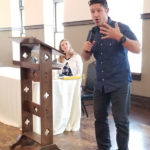More than 1.5 million refugees have fled from Ukraine while many of their fellow citizens remain in harm’s way in their homeland. Their collective suffering shapes my Lenten practice of fasting this year.

In the weeks leading up to Lent, I debated whether to physically fast from something. One form of self-denial, which I have practiced during Lent previously, came to mind even as I tried to block it. I overheard other Catholics eschewing self-denial and opting to focus on positive activities, adding something instead of subtracting. What would work best for me?
Then Russia invaded Ukraine, mercilessly attacking its neighbor with tanks, planes and bombs. Images of shell-shocked Ukrainians, some huddled and packed into public transit stations, others waiting in traffic jams to flee the country, and teary-eyed husbands kissing their departing wives and children goodbye, made an impression on me. Any sacrifice I make is voluntary; my brothers and sisters in Ukraine have no choice but to sacrifice.
On Ash Wednesday, Bishop Thomas Zinkula and I sat in the KALA Radio studio in Davenport for the monthly Catholic Messenger Conversations podcast, talking about making Lent a meaningful experience (https://tinyurl.com/33uew57d).
The bishop’s advice focused on connecting prayer, fasting and almsgiving on a synodal Lenten journey, walking in solidarity with others.
“We think about, ‘Why am I fasting? What’s the purpose?’ We can be fasting for people who don’t have any choice and then be thinking about them,” the bishop said. The thinking leads to prayer and prayer inspires us to give back, perhaps the money we save from whatever thing we are giving up. “During Lent, we can be together through these three traditional practices (prayer, fasting and almsgiving) if we’re intentional about it. How can we weave them together?”
The bishop did not divulge his penitential practice(s) for this Lent, reminding me of Matthew’s Gospel for Ash Wednesday. The Scripture began: “Jesus said to his disciples: ‘Take care not to perform righteous deeds in order that people may see them; otherwise you will have no recompense from your heavenly Father …”
The bishop joked that he would be violating the Scriptures if he told me what he was doing for Lent. “Then I won’t share what I’m doing,” I responded. “You go first and maybe I’ll share,” he joked again. “You’re right,” I said. I need to do my suffering in silence.” Truthfully, I don’t want to share my Lenten fast because it might seem trivial to some. But it is a big temptation to me!
On a more serious note, the bishop said, “We need to be more intentional about it. Whatever we do, we should be asking ourselves, ‘What does this manner of prayer, this manner of fasting, this manner of almsgiving, have to do with preparing me to celebrate Jesus’ resurrection?”
We should be asking ourselves how the things that tempt us in the first place cause a separation from God. “Pray about it; go to confession. Go deeper into it,” the bishop said. We need to bring God into it, lean into God when the temptation arises. Fasting is not about my success at self-control; it is about my relationship with and dependence on God.
“Athletes deny themselves all sorts of things,” Paul says in his first letter to the Corinthians. “They do this to win a crown of leaves that withers, but we, a crown that is imperishable” (1 Cor. 9:24-27). I desire the imperishable crown that leads me to God. Self-denial, done in solidarity with my brothers and sisters in Ukraine, is now part of my Lenten journey.
(Contact Editor Barb Arland-Fye at arland-fye@davenportdicoese.org)











